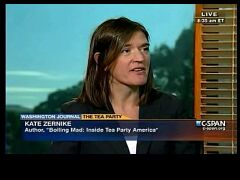Times Polls Tea Partiers, Finds Them Educated, But Also Angry and Inconsistent
Thursday's lead New York Times story on a new poll of Tea Party members (a joint effort by the Times and CBS News) got off to a promising start with a headline that probably truly qualified as news for the paper's liberal readership: "Poll Finds Tea Party Backers Wealthier and More Educated."

The story by Kate Zernike and Megan Thee-Brenan also began on an upbeat note (Zernike has evidently taken L.A.-bound reporter Adam Nagourney's place on the poll-watch beat):
Tea Party supporters are wealthier and more well-educated than the general public, and are no more or less afraid of falling into a lower socioeconomic class, according to the latest New York Times/CBS News poll.
The 18 percent of Americans who identify themselves as Tea Party supporters tend to be Republican, white, male, married and older than 45.
They hold more conservative views on a range of issues than Republicans generally. They are also more likely to describe themselves as "very conservative" and President Obama as "very liberal."
But by paragraph four, the Times began to portray the movement as "angry," paranoid, and possibly anti-black.
And while most Republicans say they are "dissatisfied" with Washington, Tea Party supporters are more likely to classify themselves as "angry."
Especially when a pollster asks them if they are angry, as the Times did.
Tea Party supporters' fierce animosity toward Washington, and the president in particular, is rooted in deep pessimism about the direction of the country and the conviction that the policies of the Obama administration are disproportionately directed at helping the poor rather than the middle class or the rich.
But is the Tea Party movement really about getting the government to "help the rich"? Isn't it more about trying to get the government to leave everyone alone, rich, middle class, and poor alike?
The overwhelming majority of supporters say Mr. Obama does not share the values most Americans live by and that he does not understand the problems of people like themselves. More than half say the policies of the administration favor the poor, and 25 percent think that the administration favors blacks over whites - compared with 11 percent of the general public.
They are more likely than the general public, and Republicans, to say that too much has been made of the problems facing black people.
....
Some defended being on Social Security while fighting big government by saying that since they had paid into the system, they deserved the benefits.
Others could not explain the contradiction.
"That's a conundrum, isn't it?" asked Jodine White, 62, of Rocklin, Calif. "I don't know what to say. Maybe I don't want smaller government. I guess I want smaller government and my Social Security." She added, "I didn't look at it from the perspective of losing things I need. I think I've changed my mind."
MRC's Brent Baker noticed that CBS News, the other poll sponsor, also couldn't resist knocking the Tea Party movement for "inconsistency."
Here's a snide aside from the original nytimes.com posting that didn't make it into the print edition:
Tea Party supporters are also more likely than most Americans to believe, mistakenly, that the president has increased taxes for most Americans.
Following is a sample of poll questions. Notice how the Times injected its own favorite description of the Tea Party movement - "anger" - into the poll, and not surprisingly ended up with a lot of self-described Tea Party members agreeing with the characterization. (You can read a .pdf version of the poll here.)
24. Which comes closest to your feelings about the way things are going in Washington - enthusiastic, satisfied but not enthusiastic, dissatisfied but not angry, or angry?
The results of Question 49 may have surprised, though Zernike didn't make much of it. When specifically asked if Obama was moving the country toward socialism, most respondents, not just Tea Party members, answered in the affirmative. (Admittedly it was a leading question, just like the one about "anger.")
49. Some people say Barack Obama's policies are moving the country more toward socialism. Do you think Barack Obama's policies are moving the country more toward socialism, or are his policies not moving the country in that direction?
Here was the response:
General Public: Toward socialism 52% Not toward socialism 38%
Tea Party Members: Toward socialism 92% Not toward socialism 6%
Question #104, asked "for background only," suggested liberal paranoia on the part of the Times:
104. "Do you or does any other member of your household own a handgun, rifle, shotgun, or any other kind of firearm?"
The last questions worked the hypocrisy angle, asking Tea Party members if they or a family member benefitted from Medicare, Social Security, or public schools, as if Tea Party members would not be entitled to withdraw benefits for a program they've been legally obligated to pay into.
You can follow Times Watch on Twitter.


